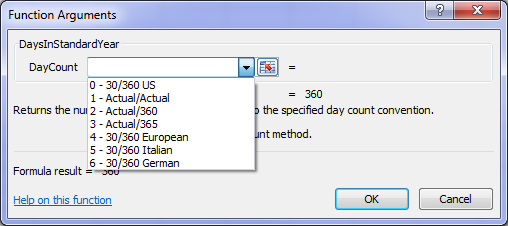Version 6.2
XLL+ 6.2 contains some important new features, including:
- Value Lists
-
Integer arguments can now have value lists assigned to them. These constrain the user's input, returning an error if the input value is not a value in the value list.
In addition, you can make a drop-down list appear in the Excel Formula Wizard, with descriptions for each of the values.

- Importing .NET assemblies
-
Using XLL+ 6.2, you can import entire .NET assemblies, and XLL+ will automatically generate add-in functions for any methods or properties that you select.
- RTD Object Handles
-
We've added a new kind of object handle, implemented using RTD (Real-Time Data). This has advantages over the previous model:
- Objects can be destroyed as soon as they are no longer in use.
- Recalculation of stale objects is automatic, and does not need macros.
- Developers can customize the appearance of handles, to make them more user-friendly.
- Asynchronous functions
-
We've considerably improved the implementation of the asynchronous function model. It no longer needs a separate signal cell as an input, and it is faster, more robust and less intrusive.
- Logging framework
-
XLL+ (from version 6.2 onwards) contains a logging framework which helps you to write diagnostic and other information to a variety of destinations, including log files and the Visual Studio Output window.
- New MFC Runtime Libraries
-
A new "minimum dependencies" build of the MFC runtime libraries has been added, which allows all MFC and CRT libraries to be included within the XLL. This removes the requirement for the Microsoft MFC and CRT DLLs to be installed on a user's machine.
- New sample applications
-
We've added new sample applications to demonstrate all the new features.
Version 6.0
Version 6.0 of XLL+ contained many major changes, see What's New in 6.0 for details.
Upward compatibility
For instructions on how to use the XLL+ Upgrade Wizard to port existing projects to XLL+ 6, please see the topic Upgrading from a previous version of XLL+.
Breaking changes
See Breaking changes for a list of changes that may affect code built with earlier versions of XLL+.
Change history
Refer to the Change history for full list of changes made over all XLL+ versions.